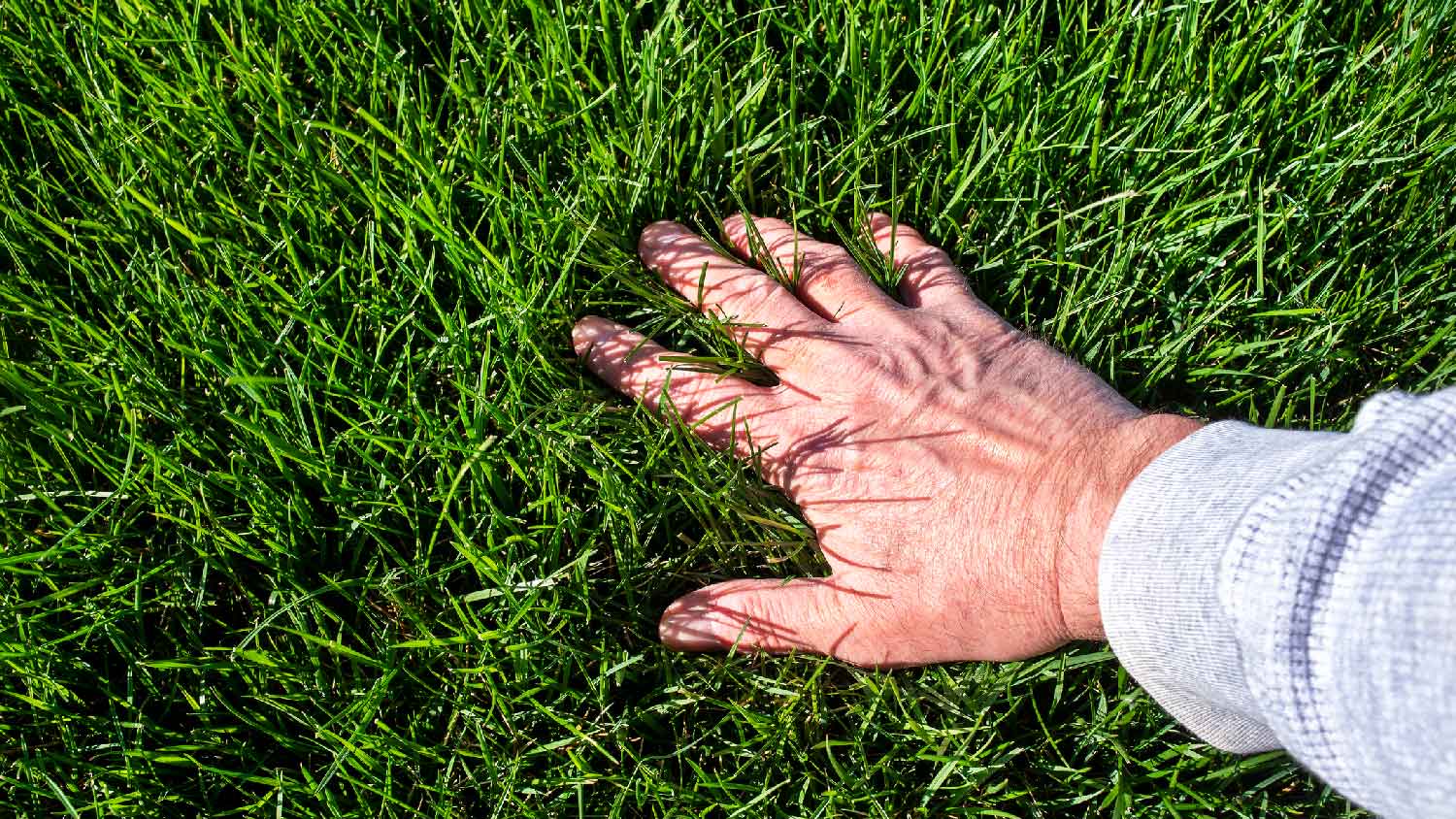Can You Overwater Grass? How to Avoid This Common Mistake
Give your grass a drink, not a drowning


Keeping your lawn watered properly ensures it maintains a lush, green appearance, enhancing your home’s curb appeal.
You should water your lawn two to three times weekly when the weather is warmer and once to twice a week in the fall.
Signs of overwatering include your lawn being muddy or always looking wet.
When there’s oversaturation, your grass’s roots will rot, killing your lawn.
To keep from overwatering, use an irrigation or sprinkler system to evenly spread the water across your yard.
There’s nothing like a lush, green lawn. Not only does it mean you’ve got quite the green thumb, but it creates a welcoming environment for your guests. It can also enhance the curb appeal of your home if you plan to sell it. But fostering a healthy yard can be tricky, as there’s plenty that can go wrong, especially in how much you water the lawn. Can you overwater grass? Absolutely. Keep reading to learn how you can avoid this common issue, find out tips for fixing an overwatered lawn, and check out more advice on how to keep your grass green.
How Often Should I Water My Lawn?
How often you should water your lawn will vary based on the climate where you live, your lawn’s soil type, and the kind of grass you have. Start by learning what type of grass your lawn has and use the watering recommendations for that as your guide. In many cases, you’ll find you need at least 1 inch of water per week for your grass to grow properly.
From there, you’ll want to allow weather to play a role in the process. In the summer, when the temps reach a sweltering peak, you’ll want to water your lawn two to three times per week, provided there isn’t much precipitation. In the spring and fall months, you’ll likely need to taper back to once to twice per week if you don’t have a super warm and dry climate.
When Should I Water My Lawn?
The best time to water grass is early morning. The reason for this is that you won’t have to compete with the sun hovering over your lawn. This allows the water to seep into the soil instead of evaporating into the air. You can also aim for watering the lawn later in the evening after the sun sets. And always keep up to date with your weather forecast. Even if there’s a slight chance of rain for the day, it’s best to put off watering it, as the longer your grass stays wet, the more susceptible it is to damage.
The best time to water grass is at dawn or early evening before the sun is fully out. This will result in less wasted water from evaporation.
How Long Should I Water My Lawn?
Another focal point is determining how long to water your grass. In most yards, you’ll want to aim for 20 to 40 minutes of watering time. The key is balancing, as you don’t want to water your grass too often. Doing so surfaces the roots, making them more vulnerable to damage.
Signs of Overwatering

Now we know how easy it is to overwater grass if you don’t find just the right balance. So, if your grass keeps dying and you can't seem to find out why, it could be due to overwatering. Here are some of the telltale signs your lawn has too much water:
Your soil is always wet or muddy
Your grass turns yellow
Mushrooms sprout in your yard
You often see standing water on your lawn
You notice bare spots on your lawn
You see a spike in your water bill
If you notice these signs, you’ll probably want to change up how you’re watering your lawn.
How Do I Prevent Overwatering My Lawn?
Keep in mind that when you water your lawn is one of the most critical aspects of keeping your lawn healthy. If you wait until the temperature outside is at its highest to water the grass, your roots might not receive as much nourishment because the sun will evaporate some of the water before it can properly soak into the soil.
Also, if you don’t have one already, you should think about calling a local sprinkler company to install a sprinkler system. The average sprinkler system costs $2,540, depending on the size of your yard and the complexity of the system you use. A sprinkler system spreads water evenly throughout your yard, so water won’t pool in certain locations. Pooling water can quickly damage some of your grass roots while other parts of your lawn don’t receive as much water as they need.
How long do you run your sprinkler system? To achieve 1 inch of watering per week, your sprinkler system must run for at least an hour. Ideally, you’ll want to break this up into two parts per week. Doing this ensures your grass receives adequate water without overtaxing the lawn.
4 Expert Tips to Keep Your Lawn in Great Shape

Along with installing a sprinkler system to avoid overwatering grass, here are a few other things you can do to ensure your grass looks lush and green:
Aerate Your Lawn
Aerating your lawn gives you many benefits, such as improved cushion, grass blade resiliency, better airflow between your lawn’s soil and the atmosphere, and reduced soil compaction. Our guide on learning how to aerate your lawn can help beginners.
Like with watering, learning when to aerate your lawn is also key. Usually, you want to do this during the peak growing season of your grass. The common recommendations are that you should aerate in early spring or fall for cool-season grass and late spring to early summer for warm-season grass.
Knowing When to Mow
There are certain times you should and shouldn’t mow the lawn. Can you mow wet grass? Nope! You should wait until your grass dries to do any mowing. When your mower cuts wet grass, it’s more susceptible to clumping. When it clumps, the grass can clog your lawn mower components and result in an uneven cut.
You can also damage your grass when you mow while it’s wet. When your grass is wet, your soil becomes softer and more vulnerable. As your mower’s tires move over your lawn, it can cause root damage as it tears out grass roots.
Measure Your Water Intake
After installing your sprinkler system, you’ll want to make sure the water output aligns with what your lawn needs. If you plan to do two waterings per week, as a general rule, your sprinklers should be putting out half an inch per watering session. To check this, you can place a bowl in the middle of the area where your sprinkler waters. Next, set your timer for 30 minutes and turn the sprinkler system on. After 30 minutes, turn off your sprinkler and measure the water in your bowl.
If you notice less or more than half an inch of water in your bowl, you’ll need to adjust your watering time. If you have more than half an inch, decrease the amount of time your sprinkler operates; if you have less than half an inch of water in the bowl, increase watering time.
Fertilize Your Lawn
Your lawn needs nourishing food to thrive. Fertilizing your lawn also makes your grass less susceptible to diseases and pest damage. Ideally, you want to fertilize your lawn once every season, or four times annually. You’ll also want to mow your lawn before you apply fertilizer—that way, it’s more likely to absorb in the roots.
If you don’t have time to do this messy business, a lawn care company can help. They’ll do regular treatments for you, so you can say goodbye to crabgrass and dandelions and hello to the lush, green lawn you’ve always wanted.





- How Long to Water Grass for a Lush Lawn—and How Often to Do It
- When Is the Best Time to Water Your Grass? Good News for Early Risers
- 7 Must-Know Tips for How to Keep Grass Green, Healthy, and Thriving
- How To Make Grass Green: Become the Envy of the Neighborhood
- Why Is My Grass Turning Yellow? 15 Solutions to Try
- 6 Lawn Irrigation Mistakes Costing You Money
- How Long to Run Sprinklers for a Lush, Green Lawn
- 12 Mistakes That Are Killing Your Lawn
- Can You Overwater Grass Seed? Tips for Getting Your Irrigation Just Right
- Spring Lawn Care: 15 Easy Steps to a Beautiful Yard











